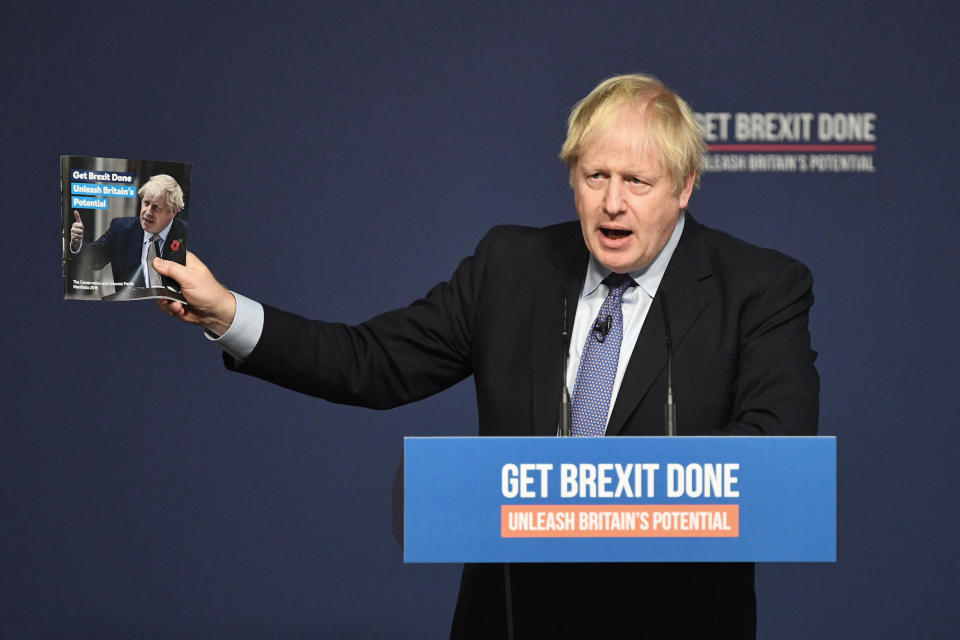Firms warn over 'inconvenient truth' on Brexit plans in Conservative manifesto

Firms have welcomed a range of policies unveiled in the Conservative manifesto, but offered prime minister Boris Johnson a stark warning over an “inconvenient truth” about his Brexit plans.
The Conservatives published their election pledges on Sunday, vowing to “get Brexit done” by the end of January and not extend the transition period where Britain stays under EU rules beyond December 2020.
But Josh Hardie, deputy director general of the Confederation of British Industry (CBI), called for an “end to damaging, politically driven cliff edges that have blighted our economy.”
There are concerns Britain could face another cliff-edge in June, the deadline for agreeing a transition extension beyond the end of 2020.
Few experts see Johnson’s plans to negotiate a free trade deal over the next year as realistic. A refusal to extend the transition could pave the way for a sudden rupture and trade on World Trade Organisation (WTO) rules, with significant new barriers to movement of goods, services, people and other links with the EU.
Hardie added that the stability offered by the transition period could not be a “Trojan horse for a bad deal.”
READ MORE: Labour, Tories and Lib Dems unveil plans to fix housing crisis
He said firms needed the certainty of a closely aligned, frictionless relationship with the EU, amid fears among businesses of significant new trade barriers if the UK government’s new deal leads to a more distant relationship.
He said: “The Conservatives’ manifesto pledges welcome action on the major issues that can improve living standards and opportunities across the country. Businesses will be heartened by a pro-enterprise vision, while looking for even more ambition on areas such as access to skills, infrastructure and reaching net zero.
“But the inconvenient truth remains: sustainable economic growth will be risked if there is a needless rush for a bare bones Brexit deal that would slow down our domestic progress for a generation.”
But the CBI and the Institute of Directors both welcomed Conservative plans for a £600m-a-year National Skills Fund to pay for adult training.
READ MORE: Microsoft fears Brexit could hit ‘frictionless’ data flows and cloud services
The Conservatives also confirmed a pledge to review business rates, promising to cut the “burden” by eventually reducing rates, and to invest in railways particularly across the north.
Edwin Morgan, director of policy at the Institute of Directors, said: “There is a desperate need to help businesses invest, so confidence-boosting measures around training, science funding and local, but very important, issues like potholes will be welcomed.
But he also warned firms would only feel Brexit was “done” when they knew the shape of the future trade deal with Europe. “There is still a long way to go, and the next government must put the needs of the economy first when negotiating on matters relating to trade and market access,” he said.
Adam Marshall, director general of the British Chambers of Commerce, welcomed the manifesto’s proposals, but said firms needed “more substantial measures to boost growth” than the party’s manifesto plans.
READ MORE: Business leaders dismayed by choice between Johnson and Corbyn
The Conservatives’ manifesto document has been widely seen as a deliberately low-key and modest set of pledges, as part of a safety-first approach with the party well ahead of Labour in the polls.
Paul Johnson, director of the Institute for Fiscal Studies, said the manifesto was “notable” for the lack of ambition compared to the other main parties.
“As a blueprint for five years in government the lack of significant policy action is remarkable,” he said.
But Johnson said the Conservatives’ ‘triple tax lock’ – a pledge for rises in income tax, national insurance and VAT for five years – was the “biggest and least welcome announcement.”
He added: “That’s a constraint the chancellor may come to regret. It is also part of a fundamentally damaging narrative – that we can have the public services we want, with more money for health and pensions and schools – without paying for them. We can’t.”